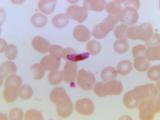Mar 10, 2009
Egypt reports baby girl infected with H5N1
Egypt's health ministry reported today that an 18-month-old baby girl from Menofia governorate has been hospitalized with an H5N1 infection, Xinhua, China's state news agency, reported. She got sick on Mar 6 after contact with sick birds and was admitted to the hospital yesterday, where she is receiving oseltamivir (Tamiflu). Meanwhile, the World Health Organization (WHO) confirmed that a 2-year-old boy from Egypt's Alexandria governorate is hospitalized in stable condition with an H5N1 avian influenza infection, making him Egypt's 57th case-patient. The boy first got sick Mar 3. The WHO's global H5N1 case count is now 410, 256 of them fatal.
[Mar 10 Xinhua story]
[Mar 10 WHO statement]
German duck tests positive for H5N1
The European Commission today reported its first H5N1 avian influenza finding in a bird this year, a wild duck that was shot in the German state of Bavaria, according to a report today from the Associated Press (AP).
[Mar 10 AP story]
Salmonella case count grows to 683
The number of patients sickened in the national Salmonella outbreak linked to peanut products climbed to 683 patients in 46 states, according to an update today from the Centers for Disease Control and Prevention (CDC). The latest confirmed illness onset date was Feb 13, and the number of new cases has declined modestly since December. At least 3,235 products have been recalled in connection with the outbreak.
[Mar 10 CDC update]
FDA seeks tool to speed Salmonella detection
To help its investigators identify Salmonella more quickly in foodborne outbreaks, the US Food and Drug Administration (FDA) has asked the departments of defense, homeland security, and agriculture to help it develop a rapid test for the pathogen, the AP reported today. Current testing methods can take as long as 9 days to identify Salmonella, but David Acheson, MD, the FDA's assistant commissioner of food safety, said he hoped that a rapid test could narrow the delay to 5 days or less.
[Mar 10 AP story]
Malaria drug shows no benefit for prion disease patients
The antimalarial drug quinacrine, although it can inhibit conversion of normal prion proteins to abnormal ones in vitro, did not significantly improve survivability in patients with prion diseases, according to study that appeared today online in The Lancet Neurology. An observational study of 107 patients, 40 of whom took quinacrine, showed that though the drug was well tolerated at 300 mg per day, only 4 of the patients had transient responses on neurologic rating scales. There are no approved treatments to prevent or reverse human prion diseases such as Creutzfeldt-Jakob disease.
[Mar 10 The Lancet Neurology study]
Sanofi to build flu vaccine plant in Mexico
Sanofi-Aventis announced yesterday that it signed an agreement with Mexico to build a $100 million facility to manufacture influenza vaccines in Ocoyoacac, Mexico. Sanofi said it would collaborate with Bimex, a Mexican federal vaccine maker, to perform some manufacturing steps and distribute the influenza vaccines in Mexico. The facility will have the capacity to make up to 25 million seasonal flu vaccine doses and will be able to switch to pandemic vaccine manufacturing once the WHO declares an influenza pandemic.




















